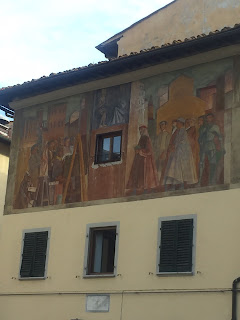Florence and Florencia: Becoming Firenze
 |
| with my boy Dante at the Piazza San Croce |
My self-study on the language got me to the point where I could have some brief Q&A when I got off the plane with our point of contact here, Rudina in Italian. It was rough, though, and I felt the pressure of trying to communicate with a native speaker in their language while knowing I was making some mistakes at least in pronunciation. I was also able to navigate to and through the process of grocery shopping after we arrived. At one place I asked them what time they closed, but when I said, "a che ora chiude?" I made little double-door closing motions with my hands that made Margaret laugh. But they sang back "mezzanotte" (midnight) and the circle of communication in my new language was complete. But I want to get better, do more, say it smoother, understand it better. And I want to do it soon.
This morning we went to the Universita degli Studi Firenze to take a placement exam. The test was no joke, challenging right from the beginning. The instructions for the test, both written and oral, were totally in Italian. Even the part designed to test elementary reading comprehension required careful attention. The question would not simply repeat a fact or phrase from the previous reading that you could refer back to and winnow out, but would use different words to refer to the same concepts or statements. So you needed to comprehend several different words to have a chance to answer correctly; a sure sign of a tough language test. I got flattened in a section that required me to not only pick out the subject of a sentence and correctly conjugate the verb with it, but choose between two common helping verbs: essere (to be) and avere (to have) and figure out the verbal tense mainly between present, passato prossimo, imperfetto and (I think) passato remoto, the rules for which are different in Italian than in Spanish. I felt bad at that moment for all the students I've put through the same pain in Spanish: those moments where you wish you had studied something better, totally guess at the right answer and cobble together something you know will make the grader roll their eyes. I came out of the test somewhere between intermediate and intermediate-advanced. I'll probably start in intermediate and see how it goes.
Firenze is hot and touristy right now, and the adjustment to the way everything is different from home is in full swing. We are already loving it here, though, and will love it more when our sleep adjusts to the jet-lag.


